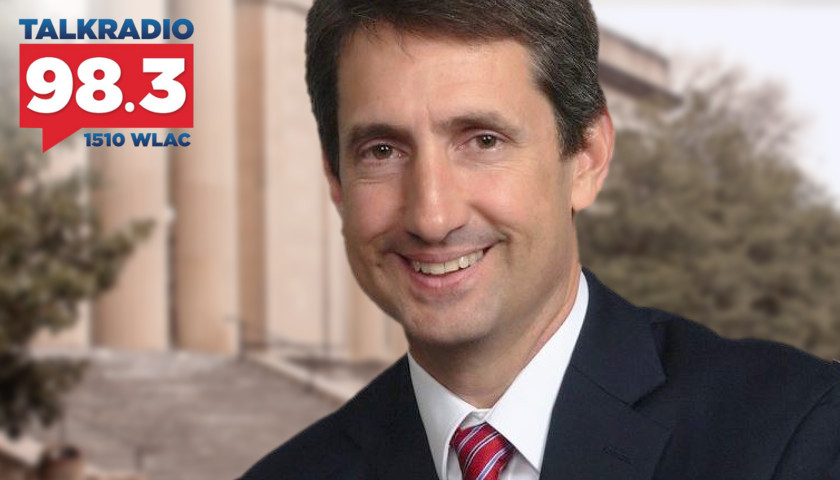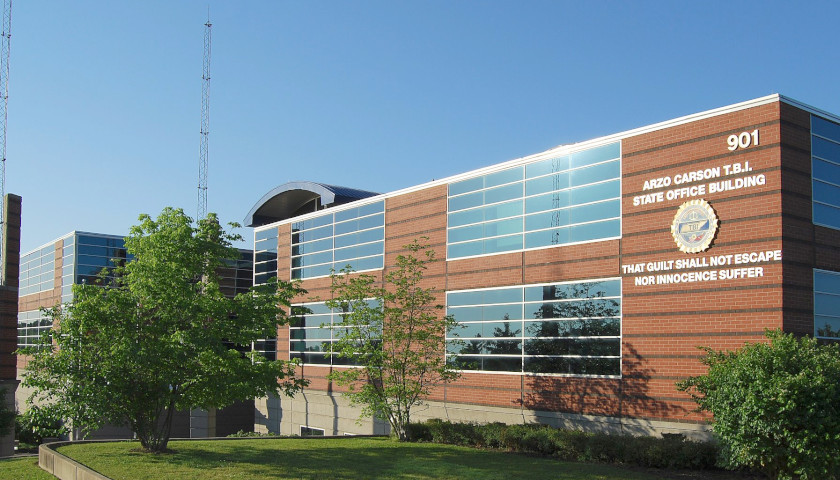Live from Music Row Monday morning on The Tennessee Star Report with Michael Patrick Leahy – broadcast on Nashville’s Talk Radio 98.3 and 1510 WLAC weekdays from 5:00 a.m. to 8:00 a.m. – host Leahy welcomed TN (R) State Representative Justin Lafferty to the newsmakers line.
During the third hour, Lafferty discussed the upcoming special and legislative sessions of the Tennessee General Assembly this week and how Tennessee should maintain a good path forward. He continued the discussion on the literacy issues facing K12 referencing that a parental role is a key component for success and that there will be more supplemental programs to help.
Leahy: On the newsmaker line is state representative Justin Lafferty who last year received an award for conservative excellence for his votes by the American Conservative Union. 93 percent was your vote, Representative Lafferty. Thanks for joining us today.
Lafferty: Hey sure. Glad to be here. And I guess since this is kind of a business of self-promotion I might as well throw in there that Club for Growth also recognized my voting record last year.
Leahy: Our kind of guy.
Lafferty: Thank you.
Leahy: We like Club for Growth and we like the American Conservative Union. And so this is the this was your first term last year and this is your second term this year’s I right.
Lafferty: Yes, that’s correct.
Carmichael: So, this is your third year?
Lafferty: Right.
Carmichael: Okay. So when you said last year, I just want to be sure of that. What did you learn in your first term that surprised you?
Lafferty: Oh, maybe the speed with which governing takes place. I’m a little bit of a student of history and our style of government was set up purposefully to move slowly so that you couldn’t make two dramatic impacts on people’s lives in too short a period of time. I guess it’d be the easiest way to sum it up. And I’m unique I think I’m not I don’t think like a lot of other folks over there. There’s a push a lot of times to get things done quickly and I’m just not sure that’s always the best way to go about things when it comes to governing the lives of six and a half million people.
Carmichael: Now I would put Tennessee is in the very very top echelon of states in terms of being well-governed. Would you fundamentally agree with that statement?
Lafferty: Yes. Our low taxes. Our low regulation. Our business-friendly environment. Yes, I absolutely agree with that.
Carmichael: Everybody who cares about Freedom appreciates the fact that you’re giving up as much of your time to be a state legislator. What does the Republican Party want to see changed to make Tennessee an even better state from a legislative standpoint over your next term? Which is two years.
Lafferty: That’s a big ask best to speak for the entire entirety of the party. We’re all pretty ruggedly individually minded folks over there. We’ve all got little different ideas. But I think it a continuation of what’s been going on for the last decade. The state of Tennessee made a strong effort to keep the regulations in check. We’ve made a strong effort to keep our spending under control. We can always do better in both regards to think. But I would hope for more of the same going forward. We’re on a pretty good path.
Carmichael: I think you have a special session on education. I know that here in Nashville, our government-run schools do not do a good job at all, especially with the Black and Hispanic communities. What can be done at the state level to move the ball in the right direction in terms of education for for for lower-income people who are stuck in a bad school because of where they live?
Lafferty: Wow. That’s a huge question and one I’m sure you and a lot of your listeners know we tried to address with the school choice. But that’s not real popular these days amongst a lot of educators. I keep coming back to this and conversations everywhere I go. When parents aren’t involved it makes it real tough on the kid.
If parent involvement were something that could somehow be increased, but I don’t know. I don’t know that there’s any program that a government could pass that would make parents, you know, spend time reading to their toddlers or taking extra time after school to help them with homework and things like that. That’s the key to it all in my opinion.
Leahy: What do you believe will be accomplished by the special session here on education this week.
Lafferty: We’re going to head back to and I’m not the best spokesperson for all the education plans that are coming up. But moving back to focus more thoroughly on reading and math and to get the basics down. If a kid can read and read well by the time they get out of high school the world’s an open door. That’s the fundamental of it all. if you can read you can teach yourself to do anything. For me, that would be something that I would like to see great improvements in over the next four to six years. And I think that’s doable with some of the programs were going to be coming up with.
Leahy: So the governor has a program. I think it’s like a 100 million-dollar improve literacy program. I think that’s on the agenda, isn’t it for this special session?
Lafferty: I believe that’s right.
Leahy: My question though isn’t that the basic fundamental objective purpose of K12 public education? And why do we need another hundred million to accomplish that basic purpose?
Lafferty: That’s a good question. That’s a real good question. The hope is to get more help to those that need it the most and those kids that are struggling. Maybe help to bring them back. And a good bit of that money to at least over the next 12 months is going to be trying to help kids catch back up for some of the time that they’ve lost. Getting some special instructors with those kids that struggled the most while we’ve always had our schools closed.
Carmichael: Is the voucher program that passed I guess a year ago or a year and a half ago a year and a half ago, is that dead now or can it be revived or massaged in this special session so that it passes muster so that it can be implemented?
Lafferty: I think we’re going to have to wait and see where the courts come out on that. I have not heard of a final court decision and whether that’s valid.
Carmichael: Okay. So at this point, the voucher program as it was passed by the legislature isn’t it’s not dead, It’s working its way through the courts.
Lafferty: Yes. That is correct.
Carmichael: Switch gears to healthcare. What are the issues before the legislature on healthcare and what do you expect the legislature to do if anything this year?
Lafferty: The issues with healthcare are always the same. How do you control cost? Again kind of like with education parents has to be involved in health care. You’ve got to have consumers involved. And we’ve been making efforts to do that more and more. one of our colleagues over there has got a bill that if you as a consumer are able to negotiate a better price with your physician or surgeon whoever it is you are dealing with and if you could pay them on the spot rather than making them go through the hoops of the insurance programs and the delay in payments you could go ahead and get them paid cash then those discounted savings hopefully go back to the insurance company.
Then the insurance company could stroke you a check instead of the doctors have to wait. Maybe putting downward pressure on prices, which would be great. So try asking your doctor next time you go in and I don’t care if it’s your dentist orthopedist pediatrician any of them ask your doctor or the folks in the office what something costs before you go through a procedure. And my experience I’ve done this several times over my experience is nobody can tell you what anything costs. Even the people that are charging the fees. that’s a problem. That is a problem. Unless you know what it costs, you don’t know what kind of value you’re getting out of it.
Carmichael: Now on the have we attempted to get Medicaid to be block granted to the state of Tennessee?
Lafferty: Yes. The resolution went through last week and was signed by the governor and it’s not the paperwork from the federal government that even states that this is not a block grant. It’s kind of TennCare 3.0. In the past, the state of Tennessee has done a nice job of coming in under what the federal government has budgeted to us to spend on health care. I don’t know how many people out there know this but the typical working model in any government agency is you spend every dollar you are allotted or you do not get as much the next year.
And there are no government agencies that do not want to get more money next year. So the incentive is to spend everything you can. But the state of Tennessee has come in under that number for the last several years and we have simply asked the federal government hey, we’ve saved you this much money. Why don’t you split that with us? Let us keep half of it because we’ve still got populations here in the state that could use some help? And that’s the goal of TennCare 3.0.
Leahy: Well state representative Justin Lafferty from Knox County’s 89th District thanks so much for joining us. And I hope you come back and give us an update as this session of the Tennessee General Assembly progresses. Thanks for joining us.
Lafferty: Thanks, Michael. It would be my pleasure.
Listen to the full third hour here:
– – –
Tune in weekdays from 5:00 – 8:00 a.m. to the Tennessee Star Report with Michael Patrick Leahy on Talk Radio 98.3 FM WLAC 1510. Listen online at iHeart Radio.









I guess it didn’t occur to you to ask about what the TN legislature was going to do to limit the power of Health Departments to shut down the economy? I mean, seriously that didn’t occur to you? If not, then you need to step out of your role.